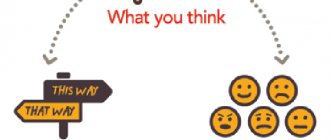Punishments in kindergarten and school
At home, you raise your child according to your own rules: you decide for yourself what and how to punish, for what and how to reward.
However, sooner or later, your baby will end up in a children's group, the rules of behavior in which may differ greatly from your “family charter,” and educators and teachers may have their own views on the system of punishments and rewards.
Naturally, almost every parent faces a number of questions: what punishments are acceptable in kindergarten or school? How should parents respond to teachers’ educational methods? when is it necessary to intervene and how to do it? how to protect your child?
Punishment of children in kindergarten
Some parents are confident that no outsider, including kindergarten teachers, has the right to punish their child. Is it so? Naturally not! The teacher has every right to apply punishment to the raging child.
Just imagine the situation: there are 15–20 children in a group and one of them starts to “get rowdy.” That is, he interferes with other children’s play, breaks newly built castles made of blocks, takes away toys, starts a fight, etc. The teacher’s task is to restore order in the group and calm down the young aggressor.
When stern looks and verbal admonitions do not work on a child, the teacher has the right (and moreover, must!) to punish the hero of the occasion.
If the adult does not react to the child’s destructive behavior, or his reaction is not effective enough, soon his comrades will join the troublemaker and literally after 10 minutes the whole group will plunge into real chaos.
Another question is what this punishment will be. Here is an important clarification: physical punishment in kindergarten is unacceptable.
Insults and any actions aimed at humiliating a little person or possibly causing harm to his health are also unacceptable.
The most appropriate punishment in kindergarten would be temporary exclusion of the child from playing with peers or deprivation of certain privileges.
For example, a teacher can sit a naughty child on a separate chair or at a desk for quiet games (modelling, drawing, etc.). Naturally, with an explanation as to why and why the child was removed from playing with other children.
This type of punishment allows the child to “cool down” and think about his behavior. An effective method would be to deprive the child of the title of team captain in the game and the ability to recruit players at will.
If the kindergarten has a live corner, the offending child may be deprived of the right to care for animals or play with them. For older children, natural consequences will be an acceptable punishment.
That is, if a child spills, scatters or scatters something, he must clean up after himself, if he tore off a button, sew it on, if he broke a toy, fix it, etc.
How to respond to punishment in kindergarten?
In kindergarten, for the first time, a child is faced with the fact that the role of a punishing hand is not a parent, but an outsider. Kids react to this fact differently - some unconditionally accept the authority of an adult, others begin to actively protest, and others may withdraw into themselves.
The situation becomes more complicated if educators use methods of punishment that differ from those accepted in the family.
Therefore, it is better for parents to find out in advance how and for what offenses their child can be punished and either prepare the child for this, or look for another preschool institution if the methods of education in this are unacceptable to you.
If the moment was missed or you were not introduced to all methods of punishment and the child complains about the teachers, first of all, you need to show the child that you are on his side, console and calm him down.
Then find time to talk with teachers (the sooner the better), try to find out all the details of the incident and understand the situation. If necessary, ask that you no longer use punishments that are unacceptable to you to your child.
If a conversation with teachers does not give the desired result, talk to the head. If after this the child continues to complain about the teachers, think about transferring the child to another kindergarten.
Remember: in order not to aggravate the conflict, the conversation with the kindergarten staff should take place in the most correct form. Even if everything inside you is boiling with anger, restrain yourself and do not threaten the teachers with legal action or physical harm.
Punishment of children at school
Parents of schoolchildren, for the most part, agree that a teacher has the right to punish a student for violating school discipline. However, the question of methods of punishing children at school causes heated debate, both at the family council and on thematic forums on the Internet.
First of all, parents should know that physical punishment in any form is unacceptable. Also, the teacher does not have the right to humiliate students (this includes insults, offensive nicknames, negative verbal assessment of the child’s mental or physical abilities, etc.
) and use as punishment a method that can harm the child’s health.
Now let's talk about what methods of punishment a teacher can apply to a child. For violations of school discipline, a teacher can:
- make a verbal remark;
- make a remark “with entry into your personal file,” that is, leave an entry in your diary;
- place the child at a separate desk;
- send to the school principal's office for a conversation;
- call parents to school;
- deprive the child of certain privileges, for example, temporarily suspend him from performing public work (wall newspaper, school clubs, etc.) or deprive him of a trip on an excursion with the class.
The method of natural consequences is becoming a fairly effective punishment, especially in middle and high school. For example, if a child damages school property, he or she may be tasked with repairing or replacing the damaged items. If the child cannot cope with this task on his own, the teacher has the right to contact the parents of the offending student.
How should parents respond to unfair punishment from a teacher?
First of all, parents need to fully understand the current situation. Sometimes, to do this, you can turn to the child’s classmates; as a rule, their view of the problem is more objective than that of the “unfairly offended” student or the teacher who punished him.
If the child was truly not at fault, or an unacceptable method of punishment was used, parents should talk to the teacher in a correct manner.
If a conversation with the teacher does not yield results, parents have the right to contact the school administration or district education departments.
Should a child be punished at home for misconduct in kindergarten?
Finally, we will discuss another important issue that raises many doubts among parents.
Imagine the situation: angry parents return from a parent-teacher meeting and give their offspring a formal thrashing, or even real terror, with pocket money confiscated, the Internet turned off, and desserts deprived for the rest of his life, or at least until the end of the week.
Many parents are familiar with this situation, and it is often associated with not the most pleasant childhood memories - when they were in the place of the guilty student. Are the parents right?
Here it is important to remember one of the basic pedagogical rules: for one crime - one punishment. That is, if a child has already been punished at school, he cannot be punished again for the same offense at home.
The maximum that parents can do is talk to the child, find out the reasons for his action, ask whether he thinks the punishment is fair, whether he understands exactly why he was punished, and whether he has drawn the appropriate conclusions. In other words, the parents’ task is to help the offending child understand the situation.
At the same time, it is important to restrain your negative emotions and talk to your child calmly, in a friendly manner.
Thanks to this, experts come to us and give answers to our questions! Also, you can ask your question below. People like you or experts will give the answer. Thank you ;-) Healthy babies to all!
Ps. This applies to boys too! There are just more girls here











